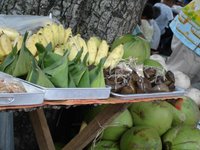
FOOD UNIT
September 8
Met with the Vice Governor of Surin Province, one of the poorest in Thailand, to hear all about their efforts to foster a transition to self-sufficient, organic agriculture. They have declared themselves a "Green Province."
September 9
Met with the organizer of a Green Market, who informed us that the government of Surin is not very cooperative in the movement toward self-sufficient, organic agriculture. Interesting. Regardless of the government's effectiveness, the things we saw in this province were decades ahead of American thinking about food security, health, and community life. Here is a picture from the green market.
September 11
Left Don Leng Tai village. Played show-and-tell (read: acted as the objects of show-and-tell) at a new school where CIEE has stationed a "community intern." Phin (his name is Phil, but Thais can't pronounce a final "l" sound) is helping to launch an organic farm at Nakudsim primary school, complete with rice, veggies, fruit trees, a fish pond, and a curriculum that incorporates self-sufficient agriculture into science, math, foreign language, and technology lessons.
Stayed with a mother who is an English as a second language teacher (sounds vaguely familiar...) and was shuttled back and forth between that house and the grandfather's, with whom we took shots of whiskey. Spent the most confusing hour of my life with a toothless Thai grandmother on hallucinogens. Finally, I came back to the house where I would sleep, which had a TV. On it was a caption in English, which read, "at this moment in 2001, the first plane flew into the WTC towers." I had forgotten all about 9/11, and this was a sobering re-discovery that made me think of home.
September 13
Visited P'Bamrung Kayotha's organic farm today. It is one of the most beautiful places I have ever known; and he is a vibrant leader in his community, roughly the equivalent of a county commissioner right now. When we came to his house to learn from him, so did about 20 neighbors. His house is built over water, and he has a whole system of fish ponds accessible by narrow, shaded walkways covered by 40 varieties of trees. He grows his own food to eat, and he raises cows, pigs, ducks, peacocks, porcupines, snakes, cats.... He roped in what must have been a 30-lb fish for dinner. Not only is his home stunningly beautiful, but it is a model for his initiative that the region move toward self-sufficient organic agriculture. It is incredible to see such a countercurrent to globalization, to see that people are moving unequivocally away from global integration. And that their health, their finances, and the structure of their communities is that much better. I am inspired by his example and can only wonder of it could work in the States. Certainly it would look a lot different, because it is a different climate that requires different local knowledge: the plants that complement each other's growth, that can be grown at a particular time of year, and that can be used for herbal medicines in all types of situations. If this local knowledge still exists in the United States, it must lie largely withing Native American reservations and the few remaining family farms. I want to learn it all before the knowledge is really gone. And what a 180 it would be to see American communities looking inward, toward subsistence farming, community development, and rural vitality.

0 Comments:
Post a Comment
<< Home